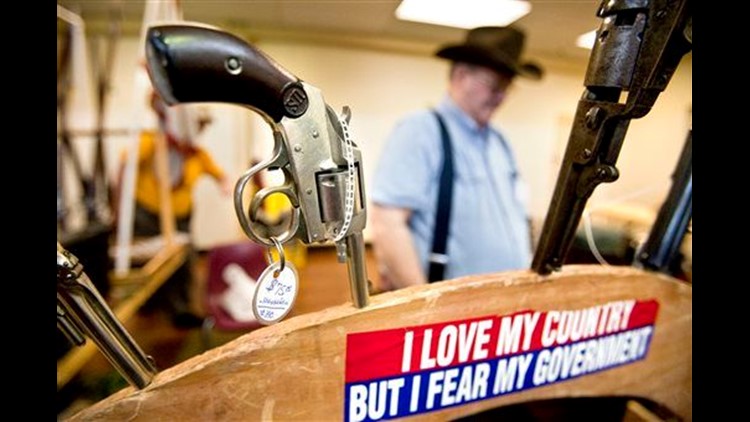OLYMPIA, Wash. (AP) — Two competing measures on the Washington state ballot this fall ask voters to take a stance on expanded background checks for gun sales. One is seeking universal checks for all sales and transfers, including private transactions. The other would prevent any such expansion.
Supporters of the initiative to expand background checks have received large donations from wealthy figures, including Microsoft co-founders Bill Gates and Paul Allen, and have spent millions, far outpacing the anti-expansion effort.
What happens if both pass on Nov. 4 is anyone's guess, though the Washington secretary of state's office has said that either the Legislature or the courts would have to sort it out.
"We've never passed rival measures dealing with the same subject," said David Ammons, spokesman for Secretary of State Kim Wyman. Ammons noted that there is no state statute or rule on what to do in such a case. "Someone would most likely bring a court challenge."
No other state has a gun-related measure on their ballot this year, but some say proponents of universal background checks in other states could gain momentum if expansion wins in Washington state.
"If you succeed here, maybe you have a shot in some other states," said Todd Donovan, a political scientist at Western Washington University.
Six states — California, Colorado, Connecticut, Delaware, New York, Rhode Island — plus Washington, D.C., require universal background checks for all sales and transfers of all firearms, according to the National Conference of State Legislatures. Other states have varying laws on expansion beyond what federal law requires, including Oregon, which requires a background check for purchases at gun shows.
Like federal law, Washington law requires checks for sales or transfers by licensed dealers but not for purchases from private sellers, like those who sell at gun shows or to friends.
So far, the National Rifle Association has kept a low profile. According to state records, the group has spent less than $200,000 against the expansion initiative, a fraction of what has been spent by its proponents. The NRA hasn't endorsed the opposing initiative.
NRA spokesman Andrew Arulanandam wouldn't address the lack of support for the anti-expansion measure, but said the group felt it was "more prudent" to put its resources toward defeating the background check expansion effort.
Arulanandam said that the NRA has two people in Washington and is spending closer to double than what's been reflected on grass-roots efforts in the state.
"Our focus is to defeat an initiative that is extremely detrimental to the Second Amendment and extremely misleading to the people of Washington state," he said.
A poll conducted by independent pollster Stuart Elway this summer indicated strong support, 70 percent, among voters for expansion of background checks. When asked separately about the anti-expansion initiative, less than 50 percent indicated support. But 32 percent of respondents said they were inclined to vote for both.
Both measures started out as initiatives to the Legislature. Lawmakers didn't take action, but under state law, the measures were guaranteed a place on the statewide ballot.
Supporters of I-594 — which would expand the number of background checks — have raised nearly $8 million dollars, with large donations from several prominent proponents. Everytown for Gun Safety, a group funded by former New York Mayor Michael Bloomberg, has donated $1 million.
Backers of the anti-expansion initiative, I-591, which also seeks to prohibit confiscation of firearms without due process, have raised just over $1 million.
Opponents of expansion take the most issue with language that would require checks for many gifts and loans. The measure has exceptions for emergency gun transfers concerning personal safety, gifts between family members, antiques and loans for hunting.
"It criminalizes lawful behavior, that's the real problem with it," said Alan Gottlieb, chairman for Citizens Committee for the Right to Keep and Bear Arms, who is leading the campaign to block expansion.
The sponsor of the expansion initiative, Cheryl Stumbo, was wounded during a 2006 shooting at the Jewish Federation in Seattle that killed one and injured others. Naveed Haq, who had passed a background check, is serving a life sentence for the shooting.
Stumbo said the need for her measure isn't diminished just because it wouldn't have prevented that shooting.
"It's like saying we shouldn't have seat belt laws because not everyone will get in an accident," she said. "Will it prevent every criminal that is bound and determined to get a gun? No. But it will deter a lot of them."
Kurt Heikkila of Tenino plans to vote against expanded checks. While the initiative exempts antique guns made 1898 or earlier, Heikkila buys historical firearms made in later years through online sites.
"The way the initiative is written, I could no longer be on those forums and freely trade or sell and buy without it going through a background check, which is not free," he said.
Hank Carson of Olympia said he is voting for expanded checks, calling it "a common-sense initiative."
"Why require background checks for some sales and not others?" he asked. "Some inconvenience and added paperwork is a small price to pay if just one incident would be prevented by this initiative."
Copyright 2014 The Associated Press. All rights reserved. This material may not be published, broadcast, rewritten or redistributed.



